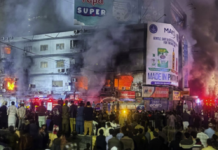New Delhi– Just nine months ago, Bangladesh stood on the cusp of a new political dawn. In the wake of the July uprising, Nobel Laureate Dr. Muhammad Yunus was widely embraced as a symbol of reform and renewal. Today, however, that initial optimism has given way to a wave of public disillusionment, with Yunus now facing mounting criticism from nearly every sector of society.
Dr. Yunus, once seen as a unifying figure, assumed leadership as Chief Advisor of the interim government with broad support from civil society, political factions, and the military. Tasked with guiding the country through a transitional period and organizing democratic elections, his administration has instead become the focal point of widespread unrest and political dissatisfaction. Recent remarks from Yunus himself, including hints at resignation, signal just how deep the crisis has become.
What began as a bold reform experiment is now widely viewed as a government that has overstayed its welcome. From the outset, Yunus’s vision clashed with political expectations. Critics argue that his administration’s unilateral policymaking, increasingly authoritarian tone, and legislative overreach have alienated both domestic and international stakeholders.
Although interim governments in Bangladesh traditionally operate within a short-term, three-month window, Yunus’s government has made little progress toward holding elections. A survey by the South Asian Institute of Policy and Governance in October 2024 found that 53 percent of voters supported a shorter tenure for the interim regime. Yet, Yunus’s focus remained on sweeping reforms rather than delivering on the primary mandate of restoring democratic order. The delay in announcing an election timeline—first floated for December 2025 to June 2026, and later revised—only intensified suspicions that the administration was clinging to power.
Public frustration grew when Yunus’s home advisor suggested the interim government should remain for another five years, while Yunus himself stated it would govern “as long as people want.” The military, once an implicit supporter, showed signs of discomfort; the Army Chief’s call for elections by December was a clear warning.
Foreign policy missteps further eroded trust. Yunus’s proposal to create a humanitarian corridor into Myanmar’s Rakhine State was criticized as a breach of national sovereignty. Military officials warned it could become a “bloody passage” and ignite regional instability. Similarly, the decision to grant operational rights for the Chattogram port to a foreign conglomerate, made without multi-party consultation, was slammed as compromising economic independence.
The government’s aggressive legislative agenda has sparked even greater backlash. Laws such as the Cyber Protection Act, amendments to the International Crimes (Tribunals) Act, and the Enforced Law Ordinance have been condemned by Human Rights Watch and other organizations as assaults on civil liberties. Once hailed as a defender of democratic values, Yunus now finds himself accused of replicating the very authoritarian practices he once denounced.
Civil society, once his strongest ally, has now mobilized in opposition. Since November 2024, strikes in the crucial garment sector have disrupted exports, fueled by unpaid wages and inflation, which reached 9.17% in April 2025. A modest wage increase failed to quell unrest.
Other reforms, such as the bifurcation of the National Board of Revenue, also backfired. Intended to boost efficiency, the measure sparked a national strike that paralyzed trade. Though the policy was later reversed, the damage to public trust was done.
Perhaps most controversially, the interim government passed the Public Service (Amendment) Ordinance, allowing civil servants to be dismissed without due process. Widely labeled a “black law,” the ordinance provoked protests across government offices, to which the administration responded with a heavy-handed deployment of paramilitary forces—an eerie echo of the regime deposed in July 2024.
Today, Yunus’s administration stands at a moral and political crossroads. The unity and hope that once defined his rise to power have been squandered. Discontent is no longer confined to political elites; it now courses through the working class, civil servants, students, and the broader public.
What began as a democratic reset has, in the eyes of many, devolved into an autocratic detour. Yunus, once revered as a visionary, now faces the bitter irony of being the object of the very resistance he once inspired.
As the sun sets on the credibility of the interim regime, the nation looks anxiously toward the future. If Bangladesh is to reclaim its democratic spirit, it must be through transparency, accountability, and respect for the people’s mandate—not through decrees, delays, and disillusionment. (Source: IANS)














